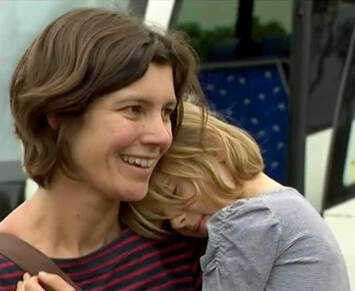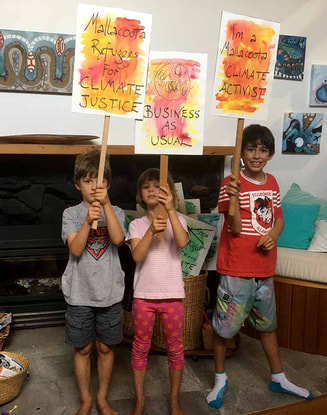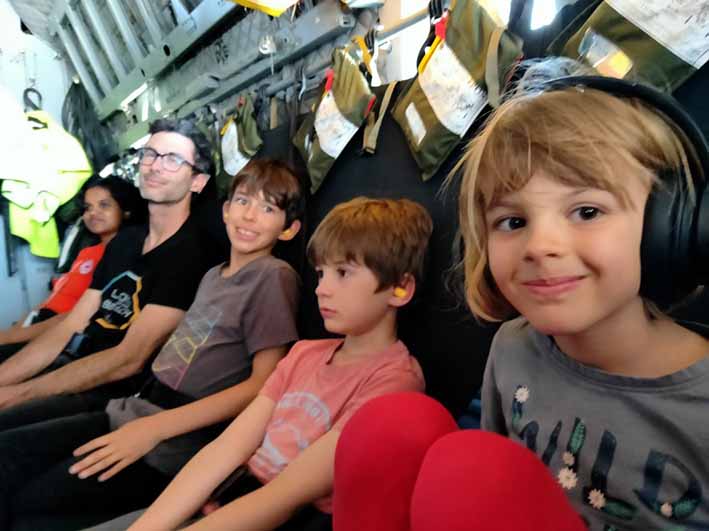 Laura's daughter Miriam and grand-daughter Audrey
Laura's daughter Miriam and grand-daughter Audrey are evacuated from Mallacoota to Sale by helicopter on January 5
I AM A grandmother of a family of climate refugees from Mallacoota: my daughter, Miriam, my son-in-law, Rory, and their three children, Leo (9), Milo (6) and Audrey (4).
Like many other families who have been directly and indirectly affected by the bushfires this summer, I am in the early stages of making meaning of what has happened. I am thinking about the meaning of home and community and about what it means to stay or leave and the implications for identity and belonging. I am reflecting on our relationship with the Earth, the damage done and the healing needed. In the face of catastrophic firestorms such as these, life becomes elemental. Beauty is intertwined with brokenness and a raw clarity distils what is important and what can be left behind.
Mallacoota is a small and beautiful town where the wilderness meets the ocean. It is where Rory grew up and where he and Miriam have lived for the last ten years. There is a strong sense of community and people look after each other. I’ve been going there since the 1980s and it’s always felt like a safe place to be. After four years of drought in the region, however, there has been growing concern. In the weeks before Christmas, there were community meetings about the inter-related implications of the remoteness of Mallacoota, the dryness of the forests surrounding the town and the large numbers of tourists visiting over the summer.
A month ago, we celebrated Christmas in Mallacoota with the extended family, returning home to Phillip Island a few days later with our oldest grandson Leo. The news of the catastrophic fires threatening Mallacoota and burning across Australia was devastating. Leo was attending the nippers’ program at Cape Woolamai and we tried to keep life as normal as we could, but he was aware of what was unfolding in his home town. He was very brave.
On the evening of December 30, Terry and I saw on the Vic Emergency website that the ‘Watch and Act’ warning for Mallacoota had been raised to an ‘Emergency’ level. The fire was expected to hit Mallacoota that night. We spoke to Miriam and she was understandably anxious. The family had spent days preparing. They had cleared leaves and vegetation from around the house and soaked hessian sacks in water in the bath in readiness for ember attacks. They had a fire hose connected to a water tank and Rory had covered all the windows with tin.
They got up at 4am and the firestorm hit a few hours later. There were three generations of family in Miriam and Rory’s home: five adults, four children and two dogs. They were vigilant in putting out fires and embers all day on their property and on adjoining properties where there was no-one to defend them. Their house and garden were covered with ash and grit. One of their chickens died but the resident koala survived. A number of houses over the road were lost, however, as was the fish co-operative down the road. In all, 130 houses in Mallacoota were destroyed.
That night, the family learned the devastating news that Rory's mother Jill had lost her home at Double Creek, a few kilometres out of Mallacoota. Jill and her husband John had built their mud brick house in the 1970s and Rory and his two sisters had grown up there. It had been an important gathering place for the family, particularly since John’s death at the age of 51. His tools were in the shed and his presence was everywhere.
Saturday 4th January 10.29am
Just to update you on the Mallacoota family - we are still in a waiting game. We are hoping that Miriam and the two little ones may get airlifted tomorrow. Today's wind and smoke have not been helpful for the evacuations by air. Rory is part of a group of community members who are collaborating to wet down each other’s homes. We think they are sending the boats that arrived in Hastings this afternoon back down there and they'll leave again on Monday …
Sunday 5th January 11.40am
We've just had the call from Miriam to say that they're on the list to be airlifted today. She and Audrey and Milo are at the Evacuation Centre now with one bag. One plane has left but she doesn't know which plane they'll be on. Terry has just left to pick them up from Sale. It's wonderful news. At this stage, it's not clear when the others may be able to leave. Miriam said that yesterday and last night were very difficult. Leo has been very brave and is thrilled that they're coming …
Sunday 5th January 10.06 pm
Miriam and the kids are all safe and sound with us after an evacuation on a Chinook helicopter to Sale, along with other children and mothers from Mallacoota. Apparently, Miriam has been on Channel 2, 7, 9, 10 and the SBS news tonight. Ain’t life precarious and infinitely precious?
Monday 6th January 2.04pm
It sure is lovely having them here. Miriam is catching up with lots of phone calls, not having had a phone for a week. Optus failed while Telstra still worked. She is sharing a lot of stories - laughing sometimes, crying quite a bit too. Sometimes one slides into the other. She’s tired but buoyed by all the messages of love coming her way. So much love is released in times of crisis.
There’s already growing momentum to stage a Mallacoota Benefit Concert along the lines of the Mallacoota Easter Festival that Rory’s father John founded and ran for 20 years.
Miriam is broken open and is full of love. She’s telling lots of people that she loves them, even people she doesn’t know.
It is early days …
Thursday 9th January 9.19pm
We have just driven to Sale to pick up Rory who evacuated today. The official evacuations are over but Rory was asked this morning to accompany a young Mallacoota boy out of town to be reunited with his mother in Melbourne. And so now Miriam and Rory are both here with the kids. They are saying it may be a month before the roads reopen …
 Leo, Milo and Audrey prepare for the Heads in the Sand climate action in Inverloch on January 17.
Leo, Milo and Audrey prepare for the Heads in the Sand climate action in Inverloch on January 17. Here is an invitation to be part of a climate action with song happening in Inverloch on Friday morning 17th January. Closely linked to this is the news that our Mallacoota family are staying with us on Phillip Island. They may be here for some time as the roads are still not open and their house still has no power. We are keenly aware of the links between the bushfires, the drought and climate change and as a family, we are going to be participating in the Inverloch climate action …
Tuesday 28th January 6.45pm
The Mallacoota family were evacuated on an airforce plane back to Mallacoota this afternoon and Miriam has rung me to say that they’ve arrived. She’s relieved to be home but is shocked by the devastation. The plane was delayed because of a mercy flight for koalas.
Heartfelt thanks for the care and support you’ve given through your messages over the last few weeks. It’s been truly appreciated …
The journey for our Mallacoota family is just beginning and the road will be long.
I have been remembering what it felt like after the Black Saturday fires and have just returned to some writing I did at the time. I am reminded of the elemental nature of that experience and the deep questioning that we engaged in. Ten years ago, those questions ultimately led us to leave our jobs at Monash University and come to Phillip Island to live.
The questions are elemental now
Existential
What does home mean?
Where is it safe?
Is anywhere safe?
How should we live our lives?
Our sweet short lives
…
We have released our possessions
Twice in one week
It’s a short step to realising
A day will surely come
When we will relinquish our bodies too
No passports needed then, not even the guitar
In the aftermath of the 2009 fires, I was deeply comforted by Mary Oliver’s poetry. Her poems are strong and direct and a call to life.
There is time left --
Fields everywhere invite you into them
And who will care
Who will chide you if you wander away
From wherever you are
To look for your soul?
Mary Oliver - Have You Ever Tried to Enter the Long Black Branches?
In his book Climate: A New Story (2018), Charles Eisenstein also asks existential questions:
“What will we become? Who do we want to be? What kind of world shall we choose?” He suggests that the climate and ecological crisis may be an initiation into a new orientation altogether. “The question then becomes not whether we can survive, but how we want to live.”
Environmental activist Terry Tempest Williams is another writer who invites us to ask the big questions. The climate is changing and we are slowly dying, she says, and we are ignoring the evidence. Speaking about her new book, ‘Erosion: Essays of undoing’ (2019) she asks, ‘Do we dare to see ourselves for what we are, broken and beautiful?’ and ‘How do we find the strength to not look away from all that is breaking our hearts?’ 3
The elemental experience of our Mallacoota family has returned us once again to ask the questions that matter.
